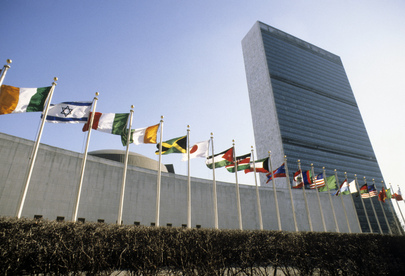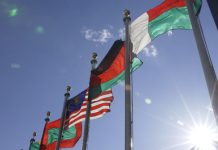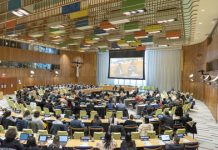UNRWA, the largest UN aid agency in Gaza, reported “no improvements” at Kerem Shalom, the main crossing point for lifesaving food, fuel and medicine.
“One of our biggest concerns now is people not having enough to eat,” the agency said, adding that aid entering the enclave is at its lowest level in months, with commercial goods “barely trickling in”.
Stricken north
The UN agency for Palestine refugees said that it continued to receive “desperate pleas” from colleagues in north Gaza where people remain trapped under rubble and first responders including the UN are blocked from reaching them.
“There is a huge sense of frustration among displaced families in north Gaza due to the horrors they are facing, which they describe as a live broadcast of their death and suffering,” said UNRWA spokesperson Louise Wateridge.
Tens of thousands of civilians are “in grave danger”, she said, echoing a statement from the UN Secretary-General on Sunday in which he expressed shock at the “harrowing levels of death, injury and destruction” in north Gaza as the Israel Defense Forces pushed ahead with their latest offensive.
Across Gaza more widely the risk of famine persists, according to the latest UN-partnered IPC food insecurity assessment. It estimated that some 1.84 million Gazans are acutely food insecure.
Less than two weeks since that assessment was published, UNRWA now says that the number of children expected to be malnourished could increase by 20 per cent.
Health services cut
Highlighting that ambulances no longer run and civil defence teams have stopped operating, the UNRWA official described the health situation in north Gaza and Gaza city as “catastrophic”.
The sick and wounded have no access to lifesaving care, “families lack food, their homes have been destroyed, they have no shelter and nowhere is safe”, Ms. Wateridge explained, adding that two of the three hospitals remaining in North Gaza governorate have been directly hit.
Power cuts proving fatal
“Patients are now dying due to the resulting power outage and lack of supplies” and doctors “are being forced to prioritize one patient over another, because there are not enough supplies, staff or facilities”, she said.
In Jabalia refugee camp in the north, meanwhile, UNRWA reported that it has not received water for the seventh consecutive day, “and our team has been unable to operate any of the UNRWA water wells”. Insufficient fuel is available to run water facilities, “forcing people to risk their lives to find drinking water or consume water from unsafe sources”, the UN agency noted.
UN humanitarians report that more than 450,000 displaced people are living in 101 flood-prone sites.
Livestock gone
An update from the UN Food and Agriculture Organization (FAO) on Monday highlighted that almost 15,000 – or 95 per cent – of Gaza’s cattle have died, and nearly all calves have been slaughtered.
Fewer than 25,000 sheep – around 43 per cent – and only about 3,000 goats – around 37 per cent – remain alive. In the poultry sector, only 34,000 (one per cent) of the birds have survived.
“There is no food, no barley, no fodder and also no water during the conflict; we had over forty heads of livestock, and now they’re twenty or even less,” said Hakmah El-Hamidi, from Al-Zuwayidah in central Gaza Strip.
Ms. El-Hamidi has received support from the FAO in the form of fodder for her animals – one of 4,400 livestock-rearing families to benefit in Deir al-Balah, Khan Younis and Rafah.
“Thank God, our animals have gotten healthier and stopped dying,” she said. The veterinary kit provided by FAO also “helped me a lot; it has vitamins and anti-flea spray. The animals were getting bitten by fleas so I spray it, as you can see. It’s really good.”
Source of original article: United Nations (news.un.org). Photo credit: UN. The content of this article does not necessarily reflect the views or opinion of Global Diaspora News (www.GlobalDiasporaNews.com).
To submit your press release: (https://www.GlobalDiasporaNews.com/pr).
To advertise on Global Diaspora News: (www.GlobalDiasporaNews.com/ads).
Sign up to Global Diaspora News newsletter (https://www.GlobalDiasporaNews.com/newsletter/) to start receiving updates and opportunities directly in your email inbox for free.


























